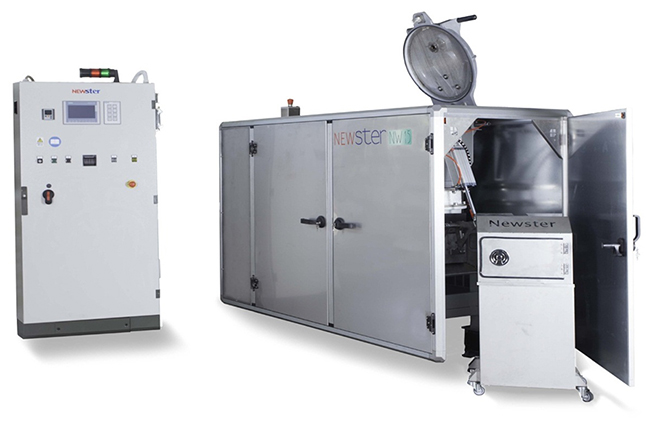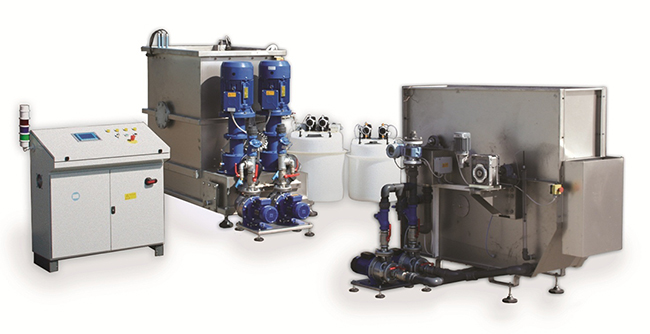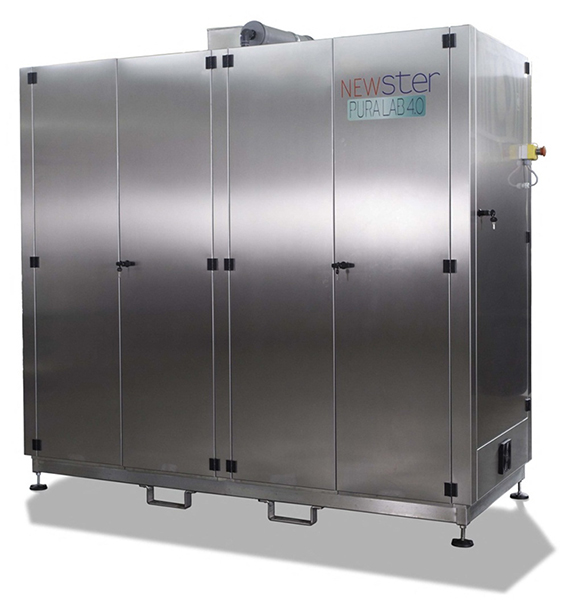Solids and liquids coming from hospitals need to be handled properly and on-site in order to avoid the risks involved and contribute to a safer and eco-sustainable future.
The managing and disposal of healthcare waste calls for solutions that give priority to the necessity of avoiding biological risks, being friendly to the environment and offer financial advantages. Modern structures are in constant search of new systems that can contribute to optimise the processes involved, while developing hospitals often face other challenges and needs, with the goal of making their facilities more functional and secure. These necessities are crucial in the medical fields and often in other sectors and spaces such as military camps and recovery communities, which produce similar waste and consequently share the same demands.
With more than 20 years of experience and an activity that involved nearly 500 hospitals in over 35 countries covering all the continents, Newster Group is an Italy based company that, mainly thanks to the work of its Technical and Research & Development Departments, is able to offer the most technologically advanced equipment to solve the problems of the potentially dangerous waste that every day, in every part of the world, are produced in medical facilities and need to be treated. The answer relies in a few key aspects: acting on-site in order to avoid the transport of the material and therefore limit the risk of biological contaminations, being fast in doing it, and consequentially becoming safe. Especially when particular kinds of waste are involved, from solids to liquids like infectious sewage water and fluids coming from laboratories. As stated in the book ‘Greening Health Care: How Hospitals Can Heal the Planet’, published by the Oxford University Press: «While hospitals have perhaps the most complex waste streams of any industry - plastic, chemicals, paper, food, needles, drugs, chemicals, medical devices, radioactive materials, packaging, and, increasingly, large quantities of electronics - the vast majority is not toxic. As much as 80 to 85 per cent of the overall waste is comparable to domestic waste. The remaining 15 to 20 percent, however, is considered hazardous and may be infectious, toxic, or radioactive».
In order to positively treat potentially infectious solid waste such as syringes and catheters, Newster Group developed the NW Series, a range of sterilizers that have their core in Frictional Heat Treatment, a patented technology included in the book ‘Safe management of waste from healthcare activities’ by the World Health Organization (commonly known as ‘Blue Book’), the most reliable source of this sector. Each sterilizer combines the work of a two rotor blades system, which takes care of grinding the material, with the proper temperature-time curve needed to sterilize it, that reaches 150 Celsius degrees. The result is a user friendly sterilizer that, without the use of any chemical agent, converts the waste in harmless material reduced in its size up to 75 per cent. This means that for 10 kilograms of potentially dangerous materials, like needles and bandages, that enters the system, what comes out after about 30 minutes are 2.5 kilogram of dry, non-recognisable and innocuous small-sized granules. No truck moves, no engine runs, no incinerator works. No additional staff members are hired, no human resources needed. The entire process takes place on-site under the control of a person that is specifically trained to do so and guarantees the maximum efficiency for the hospital and the community that surrounds it.
Starting from 2017, Newster sterilization units can be equipped with optional dedicated devices for remote control that allow to download the cycle reports and control in live-time the machine activity from any desktop-pc connected.
Compared to the amount of time, activities, risks and financial costs of transporting the waste from the hospital to an external disposal centre, this solution is more efficient and eco-sustainable in all the mentioned aspects.

Figure 1: Newster® Sterilizer NW15
To verify the results of Newster Group’s sterilizers, the Department of Biology and Evolution of the University of Ferrara, Italy, tested a series of sterilization cycles of waste collected in various departments of a 120-bed hospital, including in-patient wards, dialysis unit, accidents and emergency, operating rooms, test laboratory, out-patient surgeries and intensive-care units, with materials like bandages, masks, cannulas, probes, latex gloves and sanitary napkins. «The material sterilization was always successful as shown by the sterilization of biological proofs and the absence of growth both in the waste mass experimentally conditioned by a high charge of Bacillus stearothermophilus spores and on the inside walls of the Newster sterilization vessel at the end of each cycle», the study states. In regards to the environmental impact during the sterilization cycles, according to the University of Ferrara, «no significant changes in microbial charge and dust charge in the operation room were detected».
Newster Group offers also a technology called Safe Water Treatment with the SWT model, which allows infectious sewage water to be disinfected. It is based on a process that uses a special grinder to dispel the organic material and remove the sludge from the water by collecting it in a separate container. The remaining liquids, which are close to 85 per cent of the total material, are then chemically treated and can consequentially be released outside the healthcare facility, with no risk of bacterial contamination. Due to these characteristics, it is ideal for small hospitals and facilities located far from urban areas that lack a proper connection to sewage systems and urban water treatment plants. The process can be monitored on digital devices thanks to a dedicated software and can handle up to 10 cube meters of water per hour.

Figure 2: Newster® Safe Water Treatment SWT
The last product of the Newster Group family, called PURALAB 4.0 and available from the current year, was developed for the treatment and neutralization of laboratory fluid waste, like solvents or blood. Thanks to a patented Advanced Oxidation Process that is combined with other chemical-physical treatments, it brings to a result that is made for at least 90 per cent by water, which can be discharged in the sewage, and 5-10 per cent by innocuous and no-toxic or in any way harmful sludge. These results are possible thanks to a research activity that was partially funded by a European program covering part of the total budget of the project, a clear sign of the value of this result for the European institutions.

Figure 3: Newster® PURALAB 4.0
In order to improve its products and create meaningful bonds with the hospitals, Newster Group is in constant touch with their staffs and receive periodic updates about the activity of the sterilizers, the systems that treats infectious sewage water and the ones adopted for the neutralization of laboratory fluid waste. Commenting the use of two sterilizers NW50, the Cairo University Hospital, Egypt, stated that the «two units have carried out till today a total of 9.000 cycles for the shredding and sterilization of about 450 tons of hazardous healthcare waste, for an economic contribution of 2.250.000 pounds».
San Patrignano, one of Italy’s main recovery communities for drug addiction, adopted a Safe Water Treatment SWT system and after a period of use reported that the applied technology «is environmentally friendly». Moreover, the advantage, «comparing to the competitive installations, is that the technology applied is based on chemical disinfection. The other important benefit is that suspended solids are automatically separated from the stream of waste water. That considerably increases the efficiency of the disinfection process».
Public and private hospitals all around the planet, academic institutions and international organizations are part of Newster Group’s growing network of partners, clients and suppliers, with the aim of contributing to a better world by offering and adopting environmentally compatible equipment designed to improve the quality of life. Over two decades in the business made the Italian company a top player globally, mainly thanks to its capacity of manufacturing and marketing certified patented systems offering ecological answers to resolve problems related to hospital hygiene with a range of on-site products that are able to satisfy all sanitary needs for waste disposal. The last step, chronologically, will be the presence of the company at the 2018 International exhibition on hospital, diagnostic, pharmaceutical, medical and rehabilitation equipment and supplies, which will take place in Singapore from August 29th to 31st.